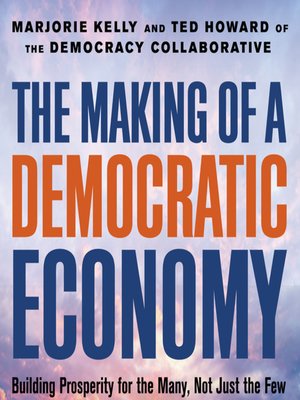The Making of a Democratic Economy
audiobook (Unabridged) ∣ Building Prosperity For the Many, Not Just the Few
By Marjorie Kelly

Sign up to save your library
With an OverDrive account, you can save your favorite libraries for at-a-glance information about availability. Find out more about OverDrive accounts.
Find this title in Libby, the library reading app by OverDrive.



Search for a digital library with this title
Title found at these libraries:
| Library Name | Distance |
|---|---|
| Loading... |
Our economy is designed by the 1 percent, for the 1 percent. This book offers a compelling vision of an equitable, ecologically sustainable alternative that meets the essential needs of all people.
Seventy-one percent of the American people say the economy is rigged against them, and they're right. Marjorie Kelly and Ted Howard describe the current economic system as the Extractive Economy-it enables the financial elite to extract maximum gain for themselves, heedless of any damage to people or planet. As an alternative, they offer the Democratic Economy, which is responsive to the concerns of ordinary people and balances human consumption with the regenerative capacity of the earth.
Kelly and Howard lay out seven principles of a Democratic Economy: Community, Inclusion, Place (keeping wealth local), Good Work (putting labor before capital), Democratized Ownership, Ethical Finance, and Sustainability. The book pairs each principle with a portrait of a place where it is being put into practice, from Pine Ridge to Portland to Cleveland to Preston, England, and more. This is a powerful, coherent, and achievable vision of an economy that serves the many, not the few.
Seventy-one percent of the American people say the economy is rigged against them, and they're right. Marjorie Kelly and Ted Howard describe the current economic system as the Extractive Economy-it enables the financial elite to extract maximum gain for themselves, heedless of any damage to people or planet. As an alternative, they offer the Democratic Economy, which is responsive to the concerns of ordinary people and balances human consumption with the regenerative capacity of the earth.
Kelly and Howard lay out seven principles of a Democratic Economy: Community, Inclusion, Place (keeping wealth local), Good Work (putting labor before capital), Democratized Ownership, Ethical Finance, and Sustainability. The book pairs each principle with a portrait of a place where it is being put into practice, from Pine Ridge to Portland to Cleveland to Preston, England, and more. This is a powerful, coherent, and achievable vision of an economy that serves the many, not the few.







